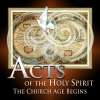
Tuesday, September 11, 2012
by Robert Dean
Passage: Acts 9:1
Series: Acts (2010)
Duration: 1 hr 4 mins 26 secs
Before we study Acts 9, a biographical sketch of Paul is essential. His road to Damascus experience is so important that the Holy Spirit has chosen to refer to it several times in Scripture. Here we see the miraculous nature of Saul’s conversion and the power of God in transforming a life. Get to know Saul through events surrounding him as he was growing up, his family, his education, his extreme persecution of Christians, his Jewishness and his leadership involvement as he spread the Christian message to the Gentiles. God’s role through intervention in history and His determination of ultimate reality are so counter to our cultural beliefs that reaction to these events has been extreme and dismissive. Learn about political correctness and its function in the suicide of Western Civilization.

Tuesday, December 18, 2012
by Robert Dean
Passage: Acts 13 & Matthew 16:15-18
Series: Acts (2010)
Duration: 59 mins 1 sec
Acts is a transition, a historical narrative that is descriptive, not a prescriptive pattern of what happens in the Church today. The phenomena of the church growth movement in the late 60s based church growth on sociological issues and stressed experience as a validation of the Bible. As is often the case with Satan’s plan, this method seemed to work. But understand fully the instruction Jesus gives Peter to feed His lambs while He builds the church. Jesus doesn’t tell Peter to manage an organization through techniques in church growth, but instructs him to proclaim and teach. Review Paul’s journeys and allow instruction from his many discourses to teach us how we can maximize our approach with the message of God’s Word to people in our lives with differing backgrounds.Also includes John 21:15-17

Tuesday, January 15, 2013
by Robert Dean
Passage: Acts 13:1-3
Series: Acts (2010)
Duration: 1 hr 4 mins 19 secs
Our scene is in Antioch in a well-established, conservative congregation, about 15 years after Pentecost. Antioch thrives with commerce and the decadent culture of the times. It also has a large Jewish population, within which are Christians, viewed as a sect of Judaism. Teachers and prophets gather to minister to the Lord and fast. What does it mean to minister to the Lord? What does fasting accomplish? Today a fast can be an initiation into a weight-loss program, a systemic purge, a social protest or a mystical manipulation of God. What was fasting about as it was practiced scripture? Is it a prescribed ritual for us? Is Biblical fasting an anachronistic term in our modern culture. Should we fast?